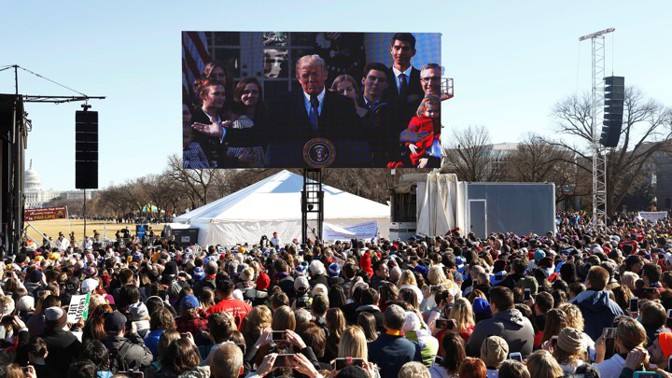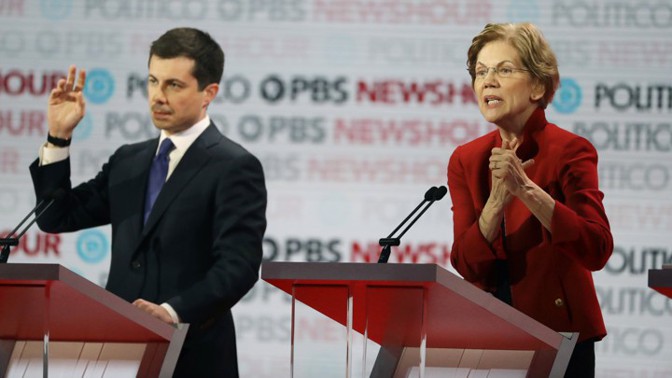It’s Friday, December 20. In today’s newsletter: The Christianity Today editorial that shook American politics. Plus: that thing about wine caves …
*
« TODAY IN POLITICS »

President Trump, speaking from the nearby White House, addresses attendees of the March for Life rally on January 19, 2018. (Eric Thayer / Reuters)
“That is not only a violation of the Constitution.”
Public evidence of President Donald Trump as a devout Christian isn’t plentiful. (In one now-infamous 2016 campaign speech, for instance, he stumbled over the name of one book of the Bible, citing “Two Corinthians.”)
In the lead-up to 2016, white evangelicals were more divided about Trump. Since Trump took office, white evangelicals have remained among his most loyal backers.
Some 82 percent of white evangelical Republicans now want Trump to stay on the party ballot in 2020, making them the subset of the party that backs him most vehemently. Impeachment seems to be pushing white evangelicals even closer to Trump.
(To be clear, there’s a yawning racial gap within the faith: In the 2017 Alabama Senate special election, 80 percent of white evangelicals voted for Republican Roy Moore, while 95 percent of black evangelicals went for Democrat Doug Jones.)
This week, an editorial in Christianity Today stunned political observers by calling for Trump’s removal. The magazine, a venue for mainstream evangelical thought, was founded by the preacher Billy Graham, whose brand of bipartisanship seems incongruous with the faith’s politicization.
As Mark Galli, the publication’s editor in chief, told my colleague Emma Green, “Yes, he’s done some good things that I am grateful for. But the moral scales no longer balance.”
Read Emma’s full interview with Galli.
—Saahil Desai
*
« IDEAS AND ARGUMENTS »

(Chris Carlson / AP)
1. “Not so long ago, working- and middle-class people were mostly spared the details of wealth.”
One debate-night phrase still echoing through the insular halls of Twitter: wine caves (the underground rooms where wine is stored and aged). Stay with us; there’s actually more to this.
“Billionaires in wine caves should not pick the next president of the United States,” Senator Elizabeth Warren had said during the final Democratic debate of 2019.
Pete Buttigieg, who was recently photographed at a fundraising dinner in a crystal-studded wine cave, hit back (Warren has a “net worth 100 times mine,” he said).
The real takeaway here may be more about how the internet changed the way we see rich people.
2. “The notion of a purity test by which candidates are measured is similar to another political metaphor drawn from chemical analysis.”
What followed the wine-caves exchange between Warren and Buttigieg was one on the purity test.
Since when did the phrase become ubiquitous political speak? The linguist Ben Zimmer takes a look.
One early political foray for the purity test occurred in 1912, when Kansas was deciding whether to adopt an amendment to the state constitution extending full suffrage to women.
Ben traces the full history of the phrase.
*
« EVENING READ »

(Nazario Graziano)
Limping Toward Denuclearization
Impeachment has overshadowed another urgent story, one that also hinges on the president’s direct relationship with a foreign leader.
Desperate to salvage the détente, Trump has been warning Kim not to “interfere with the U.S. Presidential Election” (as if North Korea’s totalitarian leader has qualms about messing with American democracy) or to “void his special relationship with the President of the United States” (as if their bromance were contractual). He has relentlessly downplayed the recent spurt of missile tests, even as they’ve become more sophisticated and harder to dismiss.
“You can’t have the North Koreans, for example, do a submarine-launched [nuclear-capable] missile test and say it’s okay, while your closest ally, Japan, is going batshit,” Joseph Yun, who served as the State Department’s North Korea envoy from 2016 to 2018, told me.
*
Today’s newsletter was written by Saahil Desai, an associate editor on our Politics team, and edited by Shan Wang, who oversees newsletters. You can reply directly to this newsletter with questions or comments, or send a note to politicsdaily@theatlantic.com.
Your support makes our journalism possible. Subscribe here.

No comments:
Post a Comment